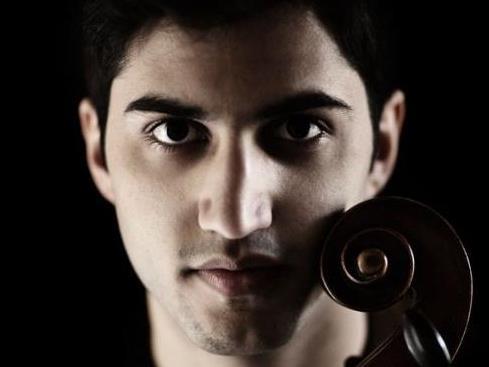Kian Soltani, cello. Photograph via Queensland Symphony Orchestra.
As with warming comfort food, you know the musical content from The Queensland Symphony Orchestra (QSO) will be powerful and exciting but also palatable and joyous. The QSO Maestro Concert offered a little known Tchaikovsky piece, Shostakovich’s splendid Cello Concerto No.1 and Rachmaninov’s mighty Symphony No.2. This was an excellent program of considered goodies, juxtaposed perfectly, and passionately delivered by orchestra, guest co-conductor and soloist alike.
Tchaikovsky’s Voyevoda, a ‘symphonic ballad’ is a gem of a piece of musical writing. There is drama, romanticism and foreboding in a short work that packs a big punch. Aurally and visually the narrative poem is present in every bar of the music, from the strength of the opening sequence – the galloping horse bringing its owner, Voyevoda, home through to the lovers’ episode and the final short section where the protagonist is killed. The forces of the QSO played beautifully with precision from the strings, harp and brass sections, while the woodwind sensitively interpreted the musical characters.Conductor, Lukasz Borowicz, coaxed excellent phrasing and orchestral colours from his players delivering a satisfying whole.
Making his Australian debut, young Iranian cellist Kian Soltani played Shostakovich’s Cello Concerto No.1 in E flat, Op. 107 with an intensity and attention to detail that was riveting to watch. Considered to be the most difficult of all cello solos in the repertoire, and given it was interpreted originally to great acclaim by Rostropovich himself, its provenance might create trepidation in any young player. Yet, in Soltani’s interpretation, there was a freshness and a confidence that gave him an authorative presence on the stage. His excellent technique, assisted by a truly magnificent instrument that had a sweet, warm resonance gave an exciting edge to his playing.
In the first Allegretto movement the orchestra was muted and deliberately low-key so that the beauty of the cello shone through. The Moderato of the second movement allowed sweeping lush sonority from the orchestra while a plaintive French horn soared over the mellifluous cello. It was spell-binding. Morphing into the third movement and Cadenza, the cello came into its own, playing without orchestral support. Here Soltani’s passionate but masterful approach rendered some of the most sensitive and exquisite phrasing of the evening to the hushed tones of the concert hall. The short final Allegro non troppo brought the full orchestra back firmly into the concerto, the virtuosic Soltani riding high during the final orchestral chords.
Soltani followed this with a short work of his own composition, its middle-eastern exotic rhythms and Persian-based melodies eliciting sounds from the cello akin to the oud. Nothing could have been further from the Shostakovich, but it showed versatility both of the player and instrument in a new and very welcome light. It was a marvellous choice for an encore.
Rachmaninov’s powerful and intense Symphony No.2 in E Minor Op.27 is one of the great symphonies of the twentieth-century and certainly one of the composer’s best loved works. Here the orchestra gave a powerful performance, led by a masterful conductor whose interpretation brought out the many nuances of light and shade within the work, demonstrating the complexities and depth of the orchestral composition.
The opening Largo – Allegro moderato was deliberately slow and languid leading to a ferocious orchestral climax, followed by a glorious cor anglais leading to the sonata form. This was romantic music at its best, structurally conventional but also modern in melody and expression. The fast scherzo movement, Allegro Molto, offered some interesting counterpoint while the complex orchestration wavered between crashing fortissimo and the gentlest pianissimo keeping the musicians keenly alert. The Adagio of the third movement, with its melodic romantic theme in the strings, was balanced by a lengthy and haunting solo from the principal clarinet, followed by a number of shorter solos from wind and brass. This was dense, rich orchestration, wonderfully played. The Allegro vivace, a magnificent final movement, displayed orchestral strength at its best, the powerful music sweeping conductor and orchestra along towards a brilliant conclusion.
Star rating: 4 stars out of 5
QSO Plays the Russians
Queensland Symphony Orchestra – Maestro Concert
Conductor Lukasz Borowicz
Cello Kian Soltani
Concert Hall, Queensland Performing Arts Centre
Saturday 17 September 2016





